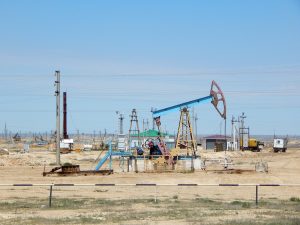Trade conferences seldom highlight negative trends within specific industries, but this year’s Kazakhstan International Oil and Gas Exhibition (KIOGE) in Almaty trumpeted a revival of the oil and gas sector, both within the country and globally.
A large number of participants gathered for the first in-person KIOGE and conference in four years.
The plenary session, hosted by former U.S. diplomat Matthew Bryza, focused on “new challenges” for the industry in Kazakhstan, namely the transition to greener sources of energy and a renewed focus on ESG criteria, which measure companies’ impact on the environment, society, and governance.
Energy Minister Bolat Akchulakov said the country will introduce a new model contract for subsoil use aimed to ease regulation and, potentially, allow for tax exemptions.
In the oil regions in the west, the government also plans the construction of several petrochemical facilities, a revival of older plans that were sidetracked by price crises and the COVID-19 pandemic.
Renewable energy sources were only mentioned at the end of Akchulakov’s speech, when he talked about the country’s ambitious decarbonization goals.
Other speakers, among them Jamie Webster of the Boston Consulting Group and Joseph McMonigle, secretary general of the International Energy Forum, stressed the paramount importance of fossil fuel consumption in the lead up to decarbonization.
According to Webster, before hydrocarbon demand falls due to ongoing efforts for decarbonization, consumption will continue to increase in the next few years. The key, the speaker argued, is to find cleaner sources, such as natural gas, as opposed to the significantly more polluting coal and oil.
“Coal production is at the highest; coal’s share in power generation is increasing, compared to the previous declining trend; and Global South countries are turning to biomass,” Webster said. “These three trends would have not happened if the world had invested enough in the development of the natural gas industry.”
Despite the downward trends highlighted by Akchulakov, particularly the prospective decline in coal production in Kazakhstan, official statistics show that extraction of coal has grown by 21 percent in the first seven months of the year.
For Kazakhstan, the next few years will be focused on a consolidation of the oil and gas sector and IPOs for the main state-owned companies.
Thorny issues continue to plague Kazakhstan’s export potential, however. The Caspian Pipeline Consortium (CPC), which links the largest fields in the country with the Russian port of Novorossiysk, has encountered several hiccups this year, from marine storms to abrupt stoppages.
Akchulakov reassured the press that the pipeline would resume work at full capacity by mid-October, after repairs.
“We will go back to the usual levels of exports once the repairs at Kashagan are also concluded, by October 20,” Akchulakov told reporters on the sidelines of the conference.
The Kashagan offshore oil field, operated by an international consortium, had pumped oil at reduced rates since the beginning of August due to a gas leak.
Last week, Kazmunaigas, controlled by the sovereign wealth fund Samruk-Kazyna, bought back a 50 percent stake in KMG Kashagan B.V., the Netherlands-registered company that holds a 16.8 stake in the Kashagan project. Kazmunaigas had sold the stake to Samruk-Kazyna in 2015, as it was looking for cash to service its debt. Now, as it looks to launch an IPO in the next few years, Kazmunaigas is cleaning house.
At KIOGE, Sanzhar Zharkeshov, Qazaqgaz chairman, announced that the company would launch an IPO in 2025. In addition, the company established two new branches, Qazaqgaz Exploration and Production and Qazaqgaz Research and Development.
Qazaqgaz, previously known as KazTransGas, was headed by Kairat Sharipbayev until mid-January, when he was fired in the aftermath of the urban protests that shook the country from Zhanaozen to Almaty. Sharipbayev was rumored to be close to Dariga Nazarbayeva, the eldest daughter of the country’s former president, Nursultan Nazarbayev.
That both Kazmunaigas and Qazaqgaz will work on natural gas exploration and development could be seen as a conflict of interest within state-owned companies. But Zharkeshov was clear in affirming the new role of his company: “Yes, there should be a standalone natural gas company. As the president said last year, this puts us in line with global trends. I hope this ends the debates in the industry on whether or not this was an appropriate move.”

































